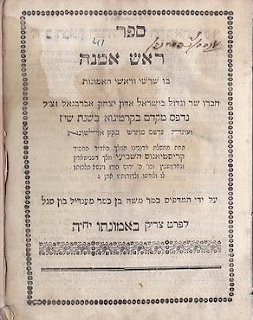 |
| A 1767 edition of Abravanel's Mashmia Yeshua. |
INTROUCTION:
The Portuguese statesman and
commentator R. Don Yitzchak Abravanel (1437-1508) had lived through the harsh
period of the Expulsion of practicing Jews from Spain and Portugal in 1492 and
1497 respectively. He sought to inspire his people by encouraging messianic
hope in order to counter the general feelings of hopelessness and despair.
Between 1496 and 1498 he wrote three messianic works: מעייני הישועה, "The Wellsprings of Salvation", a
commentary on the Book of Daniel; ישועות משיחו,
"The Salvation of His Anointed", an interpretation of rabbinic
literature about the Messiah; משמיע
ישועה,
"Announcing Salvation", a commentary on the messianic
prophecies in the prophetical books. These form part of the larger work
entitled מגדל
ישועות,
"Tower of Salvation". Abravanel counts Daniel - a symbol of
the messianic idea - as one of the prophets, which goes against the Talmudic
and rabbinic tradition which places the book under Ketuvin (Writings)
and not Nevi’im (Prophets).
This article, based extensively
on the research by Professor Eric Lawee
deals with some of these messianic ideas expressed by the so-called ‘father’ of
Jewish messianic movements, Abravanel. After the Expulsion, Abravanel believed
that the messianic arrival was imminent. Most of Abravanel’s messianic writings
took place in the post-Expulsion period.
Generally speaking, scholars have
held that Abravanel’s messianism was influential in shaping future messianic
trends within Judaism, but as we shall see, Lawee points out that that assumption
is not always so clear.




